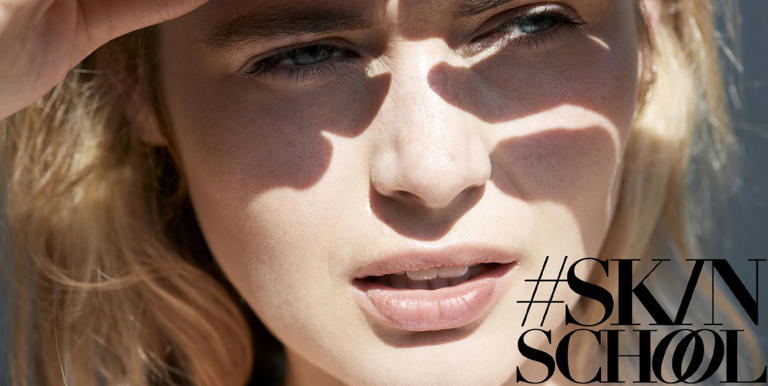











Suffering with eye eczema? Experts reveal how to treat the symptoms
Eczema (also known as dermatitis) is a persistent condition characterised by dry and itchy skin, and given that the eye area is very delicate, it’s a common place to experience it.
“The skin is much thinner around the eyes and is therefore more vulnerable to a lot of things that may cause an eczema flare-up,” Dr Anjali Mahto, consultant dermatologist at Self London, tells Bazaar. “It is prone to irritation more so than say the skin on your nose, for example,” she adds, confirming that eczema around the eyes can develop suddenly, and in isolation. However, “those who have suffered with eczema from childhood may find that they are more susceptible to developing eczema on the eyelids”.
Anecdotally, eczema on the eyelids, or the surrounding eye area, is on the rise. Dermatologists like Dr Mahto are seeing more cases in clinics, and on social media it’s trending – for want of a better word – with #eczemaeyes racking up 59.3 million views on TikTok and counting.
What causes ‘eczema eyes’?
“One of the reasons for seeing eczema around the eye area at the moment is because of product overuse,” reveals Dr Mahto. “Patients are using too many actives all at once, and even though they are not always targeting the eye area with their application, the ingredients in the product inevitably migrate and that’s when we get irritation and potential eczema flare-ups.”
Cosmetic doctor and dermatology specialist at Trikwan Aesthetics, Dr Zoya Diwan, agrees, citing how the Covid-era skincare boom led to “people trying a lot more ingredients on their skin”. As well as the actives (such as retinol, vitamin C and exfoliating acids), the fragrance in products can pose a problem. “A lot of skincare has fragrance in, which can irritate the area around the eyes if you have sensitive skin.”
Eczema can also be caused by an allergic reaction to something that the skin has been in contact with, the most common being nail polish. In particular, most gel and acrylic formulas contain methacrylate chemicals, which are known irritants and causes of allergies. If insufficiently 'cured', a reaction to the chemicals can occur on the skin, such as that of the delicate eye area, when coming into contact with the fingertips. This isn't to say that you should avoid getting manicures, but if you're opting for gel polish ensure that your technician is sufficiently trained and adheres to the exact curing time dictated by the polish brand they're using.
Products aside, the environment plays a part, too. “It always starts getting worse around hay fever season,” Dr Diwan adds. With the release of histamine prompted by allergens entering your system, symptoms like itchy eyes are common for hay fever sufferers, triggering eczema flare-ups for those susceptible.
Treating ‘eczema eyes’
“Eye eczema can manifest in dry scaly patches, a rash, weeping sores, a thin creased appearance of the whole eye area, as well as in other ways too,” says Dr Mahto, cautioning that it’s imperative to ensure that you do indeed have eczema before you begin to try and treat it. Resist the urge to turn to TikTok to self-diagnose and see a skin specialist. “A consultant dermatologist will be able to assess the area and provide you with the correct diagnosis.”
In the age of digital dermatology, it’s now possible to get prescriptive advice via video and phone-based consultations, as well as in clinics.
Whether seeing a patient suffering from eye area eczema in person or virtually, as a starting point Dr Mahto “would advise using products without fragrance or essential oils – as these can be irritating to the eye area”. From there, “it might be that we need to prescribe a mild topical steroid for you to apply to the area to get it under control”.
Beyond those options, she has some general tips for preventing and alleviating the eczema:
- “Try to avoid touching the eye area too much; constant scratching can exacerbate the condition.”
- “Avoid highly fragranced products where possible as these are likely to irritate eczema-prone skin.”
- “Try not to spend too much time in a hot shower or bath, as hot water can also be irritating.”
- “Consider switching to a gentler mascara if you want to wear make-up, like the La Roche-Posay Toleriane Volume Mascara.”
- “A flannel rinsed in cold water and held on the eye as a compress can provide some relief and may help prevent with itching.”
Reference: Harpers Baazar: Bridget March
No thoughts on “Suffering with eye eczema? Experts reveal how to treat the symptoms”
Articles - Most Read
- Home
- LIVER DIS-EASE AND GALL BLADDER DIS-EASE
- Contacts
- African Wholistics - Medicines, Machines and Ignorance
- African Holistics - Seduced by Ignorance and Research
- African Wholistics -The Overlooked Revolution
- The Children of the Sun-3
- Kidney Stones-African Holistic Health
- PART ONE: DIS-EASE TREATMENT AND HEALTH-3
- 'Tortured' and shackled pupils freed from Nigerian Islamic school
- The Serpent and the RainBow-The Jaguar - 2
- PART ONE: DIS-EASE TREATMENT AND HEALTH-4
- PART ONE: DIS-EASE TREATMENT AND HEALTH-2
- King Leopold's Ghost - Introduction
- PART ONE: DIS-EASE TREATMENT AND HEALTH-5
- African Wholistics - Medicine
- Menopause
- The Mystery System
- PART ONE: DIS-EASE TREATMENT AND HEALTH-6
- The Black Pharaohs Nubian Pharaohs of Ancient Egypt
Who's On Line?
We have 27 guests and no members online
Ad Agency Remote
Articles - Latest
- New genetically-modified purple tomato made with DNA created by scientists
- Pili Nuts Nutrition Facts and Health Benefits
- Why you’re hungry all the time – and what you can do about it
- The hidden health hazards of vegan sausages
- The living hell of insomnia – and the solutions that don’t work
- What Is Mizuna? Top 6 Benefits of This Supergreen
- 11 Proven Health Benefits of Ginger
- A daytime nap is good for the brain
- Ancient Roman Medicinal Plant Was Feared Due to 'Insanity, Giddiness' Effects: Study
- Shock of the old: 10 scandalous vintage medicines – from asthma cigarettes to cocaine wine
- What Happens to Your Body When You Eat Blueberries Every Day
- Magnesium is brilliant for sleep and cramps - here's how to get enough of it
- How psychosomatics works and what our body tells us
- Atrial fibrillation linked to high mortality and hospitalization rates, UQ study shows
- Ask A Nutrition Professional: What Are The Health Benefits Of Herbal Tea?
- Study reveals human gut plasmid with biomarker potential
- What Makes Spinach So Healthy?
- 'Why don't we recognise the importance of men in care professions?'
- Burdock – 7 Amazing Benefits & Nutrition Facts

